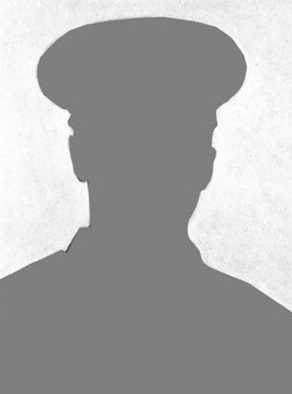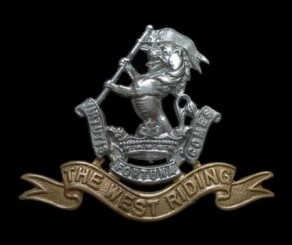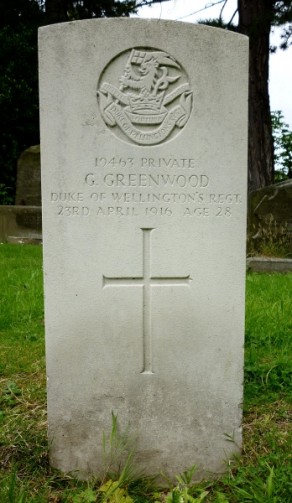28 April 1916
BARNOLDSWICK – A SOLDIER’S SUICIDE – DID NOT LIKE THE ARMY
The circumstances attending the death of a private soldier named George Greenwood, of the 3rd West Riding Regiment, whose body was recovered from a small private reservoir in the township of Bracewell on Monday morning, were the subject of an enquiry conducted at the Town Hall, Barnoldswick, on Tuesday afternoon by Mr. Edgar Wood, coroner for the district, and a jury of which Mr. Edmondson Watson was foreman.
Clara Greenwood, wife of Frederick Greenwood, 19, Emery Street, Keighley, identified the body as that of her son, 28 years of age. He came home on week-end leave from Cherton Camp, North Shields, on Saturday night, the 15th inst., but only stayed at home about an hour, leaving the same night by the 10-6 train for Barnoldswick, to visit friends at a farm known as Bonny Blacks, where he had formerly worked as a farm labourer. On the following Wednesday, witness received a letter from the Lieut. of his regiment stating that he had overstayed his leave and that unless he returned to camp immediately he would be arrested as a deserter. Witness took the letter over to Barnoldswick and after reading it deceased stuck it in the fire, saying he would not go back until he was fetched. Witness pleaded with him to return.
The Coroner: Did he give you any reason for not going back?
“NEVER OUGHT TO HAVE BEEN PASSED”
Witness: I don’t know that he did; but he has always been peculiar and never ought to have been passed for the army. He has been three months in Menston Asylum when 16 years old, and never worked until he was 21, when he started ‘messing about’ for farmers.
The Coroner: I suppose the military authorities would not know about that?
Witness: He attested somewhere over Settle way, I think. I don’t know whether he told them or not. He was always ’funny’ when the moon was at the full. We could not do anything with him, and had to let him have his own way.
The Coroner: Did he say anything about committing suicide?–He said he would drown himself rather than go back.
Where was he staying when you saw him?–At Bonny Blacks.
What did the people there say?–They tried to persuade him to go back.
Has he ever threatened to commit suicide before?–No; I don’t think he would now if it hadn’t been that he did not like the army.
Did he make any complaint about anybody at the camp?–No, not to me.
DID NOT LIKE THE ARMY
Clara Dyson, maid servant at Bonny Blacks, said deceased arrived there late on the Saturday night and told them he had leave until Monday night. He appeared all right on the Sunday, but told witness he was not going back.
The Coroner: Did he say why?–Yes, he said he did not like the army. Witness tried to persuade him different, but he stuck to his determination and stayed there a whole week. He left on Saturday night, saying he was going home to Keighley, but witness saw and spoke to him again the following night outside the house, telling him he ought to have gone back. He made no reply.
The Coroner: How had he been during the week?–He appeared all right until the time when he ought to have returned, when he became down-hearted. He was a bit funny at times. Witness had known him two or three years, during which he had worked on farms in the neighbourhood. He went to be attested along with another young man about six weeks ago.
The Coroner: Did he say then he didn’t want to go?–Yes.
Do you know whether he appealed for exemption?–No.
Have you seen him since he joined until he came home?–No, but he has written to me saying he did not like it at all.
Did he say why?–Because he didn’t get sufficient food.
Was that the only complaint he made?–Yes. He has had a good home and felt it having to go away. He said his mother sent him a parcel of food every Tuesday.
AVERSION TO MILITARY SERVICE
Richard Elsworth, Hesketh Farm, Bracewell, said he had worked along with deceased and knew of his aversion to military service. Witness did not think he appealed for exemption. While staying at Bonny Blacks he came on the Tuesday and asked witness to shave him, saying he was going back. Witness saw him again the following day in the presence of his mother, and again on Good Friday night. When witness expostulated with him on the latter occasion, he replied “I shall only get three or four days in the guard room; a young chap like me can stand that.” Witness met him again on Sunday evening going towards Barnoldswick and remarked to him, “Tha’ll catch it.” Deceased replied that he could not do with soldiering;–they had broken his heart, and if he went back he would get six months. “You will find me in the tank,” he added, to which witness replied, “Now’t at all o’t sort; tha’ll be calling at Slater’s ta bid him good neet.”
The Coroner: You thought he was only joking?–Yes.
Did he seem very depressed?–No; he looked rather white. The tank where his body was found was two field-lengths distant.
Did you tell anyone you had seen him?–Yes, Broughton Harmer and Hartley Wilson. They said he would be making to Barnoldswick for the 7-30 train.
THE DISCOVERY OF THE BODY
Jas. Wilson Hartley, tenant of the New Ing Farm, in the township of Rimington, said deceased had worked for him for three weeks before joining the army. He did not appeal for exemption. Witness did not know he had been in the asylum, though he was rather peculiar at times. He last saw Greenwood on Friday morning, when he seemed all right, saying he was going back by the first train on Saturday morning.
The Coroner: Did he say anything about having overstayed his leave?–I told him he had better be going or he would get into trouble. He did not say he was not going back. Witness saw him again on the Sunday evening about six o’clock, but not to speak to. He also saw the previous witness, but was told nothing to create suspicion. He and Harmer were having a walk around when they saw a khaki overcoat and hat hung on the railings of the tank in Hesketh Rough. Approaching, they could discern deceased lying at the bottom of the tank, which was about nine feet deep, with cemented sides, and contained 6-ft. 6in. of water. Having nothing at hand with which to recover the body, Harmer went and gave information to the police.
The Coroner: Had you any suspicion last week of anything of this kind?–None whatever; I never heard it mentioned.
Deceased never gave you any reason to suspect he was not returning to the army?–No.
And it was quite by accident you happened to go past the tank?–It was.
ARMY BUSINESS TOO MUCH FOR HIM
Broughton Harmer, 9, Pleasant View, Barnoldswick, deposed to seeing deceased about seven o’clock on Sunday night at Bonny Blacks farm, having something to eat. Witness advised him he had then nice time to catch the 9-30 train from Barnoldswick to Keighley, and that by doing so he would save further trouble. He said he would go.
The Coroner: He did not tell you he was not going back to the army?–Not at that time, but I heard him say so on several previous occasions.
Did he say why?–He gave no definite reasons, but from what I could understand, he did not like the business at all. On Sunday night he said he would go back as he left the farmyard. Witness thought he was going to catch the train, and did not see him again until finding his body in the tank.
P.C. Milburn said he received information of the occurrence at 8-50 on Sunday night from the previous witness, arriving on the scene about 10 o’clock. It then being quite dark and the tank dangerously situated he could not recover the body until next morning, when he was assisted by P.-Sergt. Williams. The place was known as Hesketh Rough Reservoir, in the township of Bracewell. It was securely fenced.
The Coroner, summing up, said it appeared that deceased had drowned himself, and having regard to the curious state of his mind at the time, there was very little room for doubt that he was of unsound mind on Sunday night. No doubt this army business had been too much for him and had sent him right off.
A verdict of ‘Suicide’ was returned.








No comments yet.